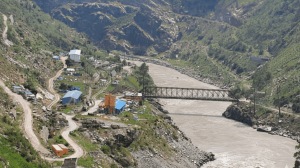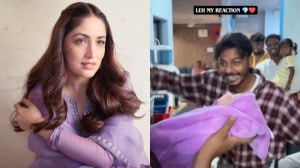Nina Plechak calls it her second displacement. First, she was forced to leave Donetsk after the 2014 Russian annexation of Crimea. And, in 2022, she left Ukraine’s capital Kyiv amid the Russian invasion.
An activist for the ethnic Greek community in Ukraine, Plechak, 35, is among a number of its people who fled to Greece as the war continued. She was in Delhi recently to present a programme showcasing the music and culture of the ethnic Greek communities of Mariupol — which have been living in the southeast of Ukraine since the 18th century. The city was left devastated by Russia’s months-long siege.

Plechak says this was the first time they were highlighting their tragedy in a foreign land.
“We are Ukrainian citizens,” she says. “In and around Mariupol, as many as 48 villages are inhabited by people of Greek origin, out of which 45 are presently occupied by Russia, making most of us refugees in other parts of the world.”
Plechak’s fellow performers — singer Liudmyla Dolher and accordionist Anatolii Bahdasar — are now refugees in Cyprus and Romania, respectively.
Together, the trio presented Ukrainian Voices: the Greek Lament of Mariupol, highlighting the destruction through ‘before’ and ‘after’ visuals.
According to the 2001 Ukrainian census, there were 91,548 ethnic Greeks in Ukraine. According to Plechak, Mariupol had people from scores of ethnicities — connected to their roots but living together as Ukrainian citizens.
Story continues below this ad
She was in Ukraine for almost a month after the invasion till she could move out and find refuge in Greece. Talking about those four weeks, she says: “We tried to stay put initially, but when we realised it’s not ending and our lives are in danger, we moved to other countries. Even though the common people of Ukraine met with many logistical and emotional difficulties during this time, we were messaging each other on social media and checking on each other.”
She says she was worried before the performance if she would be able to convey the main message — “that Ukraine is a multicultural, tolerant country where Greeks of Ukraine could freely popularise their culture and express an ethnicity without fear of pressure”
“But after Russian armed aggression against Ukraine and occupation of more than 95 percent of territory, where the Greeks of Ukraine were living, the unique culture of the Greeks of Ukraine is under threat of extinction,” she says.
Ivan Konovalov, Charge d’Affaires of the Ukrainian Embassy in India said: “We are united with Europe, and are confident that we are one family. We shall continue to fight till victory. The cultural festival can be useful towards making the public aware of the common roots between Ukraine and Europe.”
Story continues below this ad
The “common roots” were dwelled upon at length by Greek Ambassador, Dimitrios Ioannou: “Ukraine is fighting for freedom and territorial integrity. The Greeks have been living in Ukraine since antiquity, and have a continuing presence.”
He said the city of Mariupol was named after the Greek name of Virgin Mary, which is ‘Maria’.
“The ethnic Greek community in Ukraine suffered for a long time during the Stalinist times. Now, they are having another nightmare. I hope they will return soon to their homes,” he said.
Buoyed by the response in India, the group says they would like to promote their culture abroad. “In May, we will go to Chicago with a photo exhibition dedicated to Mariupol and Greeks of Ukraine,” Plechak said.
Story continues below this ad
India is presently holding the G20 Presidency, which has Russia also as a member-state. Russian President Vladimir Putin is likely to visit Delhi for the G20 Summit in September. The visiting Ukrainian First Deputy Foreign minister, Emine Dzhaparova, had said last month that their President Volodymyr Zelenskyy would be happy to address the G20 Summit.









